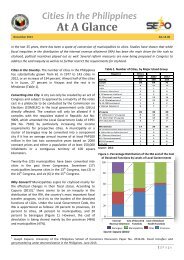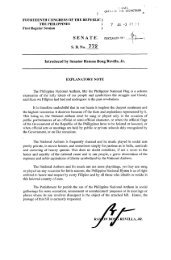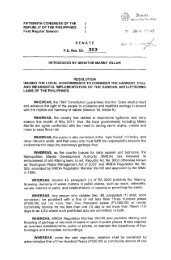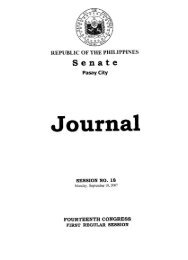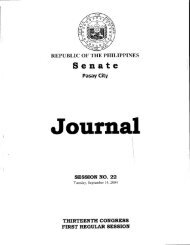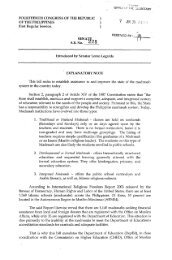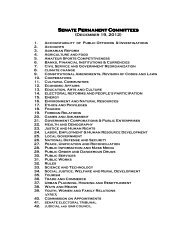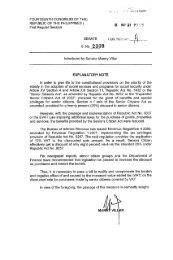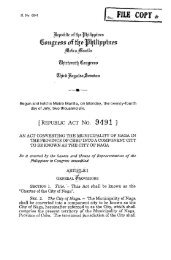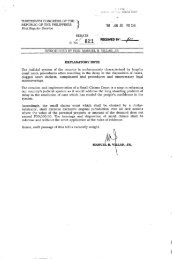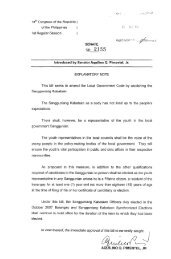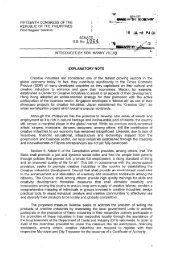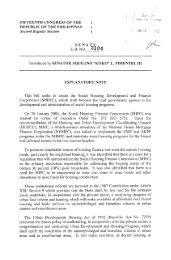SBN-2168 (as filed) - Senate
SBN-2168 (as filed) - Senate
SBN-2168 (as filed) - Senate
You also want an ePaper? Increase the reach of your titles
YUMPU automatically turns print PDFs into web optimized ePapers that Google loves.
FOURTEENTH CONGRESS OF THE REPUBLIC)<br />
OF THE PHILIPPINES 1<br />
First Regular Session )<br />
Introduced by Senator Miriam Defensor Santiago<br />
EXPLANATORY NOTE<br />
The law on infidelity in the custody of prisoners is of 1930s vintage. The penalties<br />
considered harsh and cruel during those days are probably too tame in today's milieu where<br />
crimes of unparalleled cruelty have become a daily occurrence. At the same time, the escape of<br />
prisoners or the flight of criminals who are virtually captured h<strong>as</strong> very often scandalized society.<br />
The government official or employee who h<strong>as</strong> charge of a prisoner more often commit such<br />
infidelity in the custody because the penalty for such a d<strong>as</strong>tardly act is light, and therefore, the<br />
lure to illegally free a prisoner through bribery is very great if not too tempting. One who frees a<br />
prisoner is part of the commission of the offense perpetrated by the prisoner. A guard who frees<br />
an inmate not only participates post litem to the cornmission of the crimes of the offender but<br />
turned traitor to the government and the laws he is sworn to protectand respect.<br />
In the Penal Code the penalty for the crime of freeing a convicted prisoners by their<br />
guardkeepers is prision correccionul in its medium to its maximum period, therefore, the<br />
penalty begins at two (2) years and one day to six (6) years. However for the crime of infidelity<br />
in the custody of prisoners who are merely in detention, the penalty isprision correccional in its<br />
minimum period, which is six (6) months and one day to two (2) years. The emph<strong>as</strong>is of the<br />
imposition of the penalty is b<strong>as</strong>ed on whether the prisoner is convicted or merely in detention. To<br />
us, this categorization is not proper and is insufficient because it is not b<strong>as</strong>ed on the gravity of<br />
the offense of the prisoner. True, the accused is deemed innocent until he is convicted. But today,<br />
there are occurrence of crimes that are so odious and atrocious that it despoils the human being<br />
and violate the sensibilities of man.<br />
The commission of crimes that are heinous, like murder, the m<strong>as</strong>sacre or the<br />
extermination of a family, terrorism, genocide by the use of weapon of m<strong>as</strong>s destruction like
dynamite and explosion have become nightmares which threaten the stability of the government.<br />
Yet every now and then we are scandalized by the rampant escape of those accused of terrorism,<br />
economic sabotage, m<strong>as</strong>sacre and similar terrible felonies from their high security incarceration<br />
while the oficials and the personnel in charge of the detainee literally go scot-free because the<br />
highest penalty they can be meted out is two years imprisonment. Society must therefore act<br />
through the law-making body of the government. The imposition of a steeper penalty is but a<br />
defense of society against government officials and employees who desecrate their duty <strong>as</strong> care<br />
takers of detention prisoners. It is not only valid but logical <strong>as</strong> dictated by necessity that the<br />
penalty of the crime of infidelity of a custodian be made in proportion to the gravity of the<br />
crimes of the illegally freed offender.<br />
This is a <strong>Senate</strong> counterpart bill to one <strong>filed</strong> in the House of Representatives by Rep.<br />
Salacnib F. Baterina.
FOURTEENTH CONGRESS OF THE REPUsLIC)<br />
OF THE PHILIPPINES )<br />
First Regular Session 1<br />
SENATE<br />
S.No.<br />
Introduced by Senator Miriam Defensor Santiago<br />
1 AN ACT<br />
2<br />
3<br />
4<br />
5<br />
6<br />
7<br />
8<br />
9<br />
10<br />
11<br />
12<br />
13<br />
14<br />
15<br />
16<br />
17<br />
18<br />
19<br />
20<br />
21<br />
22<br />
23<br />
24<br />
25<br />
26<br />
DEFINING THE CRIME OF BETRAYAL OF DUTY IN THE CUSTODY OF PRISONERS<br />
PROVIDING FOR ADDITIONAL RULES ON THE IMPRISONMENT, DETENTION,<br />
CONFINEMENT AND CUSTODY OF PRISONERS AND DETAINEES, SPECIFYING<br />
ADDITIONAL WORK AND RESPONSIBILITIES OF GOVERNMENT PERSONNEL<br />
CHARGED WITH THE CUSTODY OF SUCH PRISONERS AND<br />
STATING THE PENALTIES THEREFOR<br />
Be it enacted by the <strong>Senate</strong> and House of Representatives of the Philippines in Congress<br />
<strong>as</strong>sembled:<br />
SECTION 1. Any provision of law to the contrary not withstanding, the crime of betrayal<br />
of duty in the custody of prisoners and detained persons is hereby defined <strong>as</strong> on act or series of<br />
acts whereby a person or persons charged with the custody of prisoners, detained persons under<br />
preventive imprisonment, persons arrested in the act of committing a crime, persons who are<br />
wonted in foreign countries by which the Philippines h<strong>as</strong> a treaty of reciprocity for extradition,<br />
persons who committed heinous crimes, terrorist and war criminals or one engaged in economic<br />
sabotage, shall allow without legal justification the escape of such prisoner or persons similarly<br />
situated shell be punished with a penalty which is one (1) degree lower than the penalty imposed<br />
for the offense which the detainee is charged wit or convicted of; Provided that in no c<strong>as</strong>e shall<br />
the penalty imposed be lower than prision correccional in its minimum period; Provided further<br />
that for the scope of a detainee wanted by a foreign country, the penalty ofprision correccional<br />
in its maximum period shall be meted out; Provided further that for the escape of the prisoners<br />
who are accused of the commission of heinous, terrorism, war crimes and economic sabotage,<br />
the penalty of life imprisonment shall be imposed without any provision for parole; and Provided<br />
finally that the persons convicted of the crime of betrayal of duty In the custody of prisoners<br />
shall likewise suffer special permanent disqualification if the detainee shall have been convicted<br />
or who h<strong>as</strong> admitted his guilt in open court, even if the decision of conviction h<strong>as</strong> not been<br />
rendered.<br />
1
9<br />
10<br />
11<br />
12<br />
13<br />
14<br />
15<br />
16<br />
17<br />
SECTION 2. In addition to the requirement considered necessary in the custody of<br />
prisoners imposed by present rules and regulations, the office or institution for high risk<br />
detainees, shall establish or add to existing rules, a record of the time the detained person w<strong>as</strong><br />
accepted by the institution, name of the persons guarding the detainee, the time and date there<br />
were turned over to guards, properly signed and acknowledged by said personnel guarding the<br />
detainee, the movement of the detainee from and to his room or cell of detention, his transfer<br />
from one institution or detention to another and such record shall at all time be properly signed<br />
and acknowledged in the said records by the person or persons in custody.<br />
SECTION 3. Person, though not in charge of the detainee, who enjoys a higher rank than<br />
the custodian of the prisoner who shall cause, aid, abet and facilitate the escape of a detainee,<br />
shall suffer the same penalty <strong>as</strong> the persons who are in custody of the prisoner but that in<br />
imposing the penalty, the court or tribunal shall impose the same in its maximum period where<br />
the same is divisible; Provided, however, that the court shall, in every c<strong>as</strong>e, impose penalties<br />
under this Act in the degree that will be fair and humane <strong>as</strong> the c<strong>as</strong>e may be.<br />
SECTION 4. This Act shall take effect fifteen (15) days after its publication in at le<strong>as</strong>t<br />
two (2) newspapers of general circulation.<br />
Approved,<br />
2



